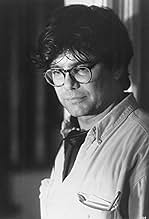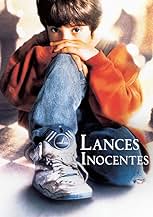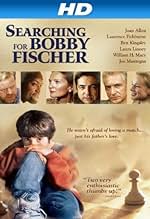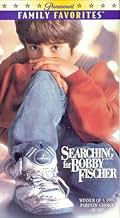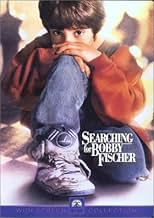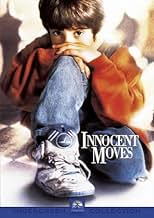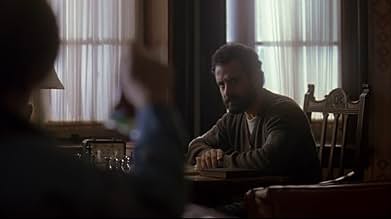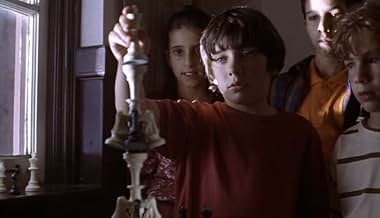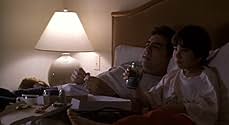A prepubescent chess prodigy is encouraged to harden himself in order to become a champion like the famous but unlikable Bobby Fischer.A prepubescent chess prodigy is encouraged to harden himself in order to become a champion like the famous but unlikable Bobby Fischer.A prepubescent chess prodigy is encouraged to harden himself in order to become a champion like the famous but unlikable Bobby Fischer.
- Nominated for 1 Oscar
- 6 wins & 11 nominations total
- Director
- Writers
- All cast & crew
- Production, box office & more at IMDbPro
Featured reviews
Josh Waitzkin is a regular boy in NYC who quickly picks up the game of chess. He befriends chess hustler Vinnie (Laurence Fishburne) who plays in Washington Square. Josh's parents (Joe Mantegna, Joan Allen) hire chess coach Bruce Pandolfini (Ben Kingsley) who tries to teach him regimented chess. It's a struggle for Josh's heart between his two mentors Vinnie and Bruce.
This is truly a wonderful movie. It is all heart. Max Pomeranc plays it with so much feeling with so few words. I love that he deliberately loses to his father at the start. He's a boy who is trying to grow up and many times, he shows that he's actually the adult in the relationships. Director Steven Zaillian makes so many great moves. And the great actors are all doing their parts. It's a really sweet movie.
This is truly a wonderful movie. It is all heart. Max Pomeranc plays it with so much feeling with so few words. I love that he deliberately loses to his father at the start. He's a boy who is trying to grow up and many times, he shows that he's actually the adult in the relationships. Director Steven Zaillian makes so many great moves. And the great actors are all doing their parts. It's a really sweet movie.
This is such a great film! And there is more than one reason why I believe this.
First of all, Ben Kingsley is one of my favorite actors. And this movie(along with "Sneakers", "Death and the Maiden", "Twelfth Night", and "Sexy Beast"), really helps me believe that. And I believe that this is one of his best characters, and best films.
As far as Max Pomeranc's acting is concerned...wonderful. Even today I can't think of a kid who's had a better performance. Truly good acting. And sadly for his short lived career, I'd have to say he was in his prime there.
The creativity in this film is awesome! My favorite scene is when Bruce(Kingsley) is teaching Josh(Pomerac) the dynamics of chess, and when the camera flips back and forth between the chess pieces, each time building up the conversation, and going up the ladder of significant pieces. Powerful scene, with powerful lessons.
I also enjoy that if you don't have much of an interest in chess, that it still keeps you capitvated. I wasn't as interested in chess until I saw this movie. And I'm even more interested in film (I thought that I couldn't be more interested).
And finally...the score. I love James Horner. And this is one of the reasons why. Along with "Sneakers", "Braveheart", and many other Horner scores, I find it makes the movie that much better.
Truly a movie to remember always.
First of all, Ben Kingsley is one of my favorite actors. And this movie(along with "Sneakers", "Death and the Maiden", "Twelfth Night", and "Sexy Beast"), really helps me believe that. And I believe that this is one of his best characters, and best films.
As far as Max Pomeranc's acting is concerned...wonderful. Even today I can't think of a kid who's had a better performance. Truly good acting. And sadly for his short lived career, I'd have to say he was in his prime there.
The creativity in this film is awesome! My favorite scene is when Bruce(Kingsley) is teaching Josh(Pomerac) the dynamics of chess, and when the camera flips back and forth between the chess pieces, each time building up the conversation, and going up the ladder of significant pieces. Powerful scene, with powerful lessons.
I also enjoy that if you don't have much of an interest in chess, that it still keeps you capitvated. I wasn't as interested in chess until I saw this movie. And I'm even more interested in film (I thought that I couldn't be more interested).
And finally...the score. I love James Horner. And this is one of the reasons why. Along with "Sneakers", "Braveheart", and many other Horner scores, I find it makes the movie that much better.
Truly a movie to remember always.
Let me start by saying I am not a person who goes for sentimental, "heart on your sleeve" type big dramas that seem to be the idol of most professional critics. In fact, to put it bluntly I totally loathe them. (I prefer movies that at least try to have a cohesive plot line with a reasonably accessible story idea and some decent tight pacing; ie: something that's both informative and fun. This is my interpretation of the classic idea of "a good story, well told".)
With that in mind, I wish to state that this movie (film, whatever) really does work, at all levels. It's a good intelligent story (apparently based on fact} about a very bright, very young kid who is discovered to be naturally good at chess and enters the serious national tournaments. During which time, there are raised issues of the concept of the winning ethos; and keeping (or losing) your humanity in the process.
This cast is magnificent here. The central leads are played by Joe Mantegna and Max Pomerance as the father and son respectively. Both give very well-balanced performances. Sensitive, without being sappy. Max in particular is very good, especially in the dramatic climax of the film; which he handles with total dignity. It could have been so over the top and patronizing in lesser hands, but this time it isn't.
They are ably supported by Laurence Fishburne and Ben Kingsley as two different types of coaches, from "opposite side of the tracks" (sorry for that old cliché). It may seem formulaic, but in this case the dramatic contrasts works surprisingly well, and both come over as intelligent representatives of their particular points of view. And there are also great character moments by David Paymer {QUIZ SHOW, MR Saturday NIGHT, etc} and Hal Scardino {THE Indian IN THE CUPBOARD} as well.
Over all, I would highly commend this film as the type of story that manages to tread the fine line between intelligent ideas and an entertaining story. I recommend it to everyone. Give it half a chance and it can work for you. It really is a great example of intelligently entertaining!
With that in mind, I wish to state that this movie (film, whatever) really does work, at all levels. It's a good intelligent story (apparently based on fact} about a very bright, very young kid who is discovered to be naturally good at chess and enters the serious national tournaments. During which time, there are raised issues of the concept of the winning ethos; and keeping (or losing) your humanity in the process.
This cast is magnificent here. The central leads are played by Joe Mantegna and Max Pomerance as the father and son respectively. Both give very well-balanced performances. Sensitive, without being sappy. Max in particular is very good, especially in the dramatic climax of the film; which he handles with total dignity. It could have been so over the top and patronizing in lesser hands, but this time it isn't.
They are ably supported by Laurence Fishburne and Ben Kingsley as two different types of coaches, from "opposite side of the tracks" (sorry for that old cliché). It may seem formulaic, but in this case the dramatic contrasts works surprisingly well, and both come over as intelligent representatives of their particular points of view. And there are also great character moments by David Paymer {QUIZ SHOW, MR Saturday NIGHT, etc} and Hal Scardino {THE Indian IN THE CUPBOARD} as well.
Over all, I would highly commend this film as the type of story that manages to tread the fine line between intelligent ideas and an entertaining story. I recommend it to everyone. Give it half a chance and it can work for you. It really is a great example of intelligently entertaining!
***SPOILERS*** The movie "Searching for Bobby Fischer" parallels the lives of Grand Chess Master Bobby Fischer with that of young seven year-old chess prodigy Josh Waitzkin, Max Pomeranc. The movie does it by inserting newsreel footage of Bobby winning the World Chess Championship Tournament in Reykjavik Iceland back in 1972 against the Soviet Unions Boris Spassky. It then jumps back to when Bobby Fischer was a young boy, and man, in the 1950's and 1960's as his obsession with chess brought him the fame and glory that he sought. Yet at the same time denied him the life of a normal boy growing up in post WWII America that his night and day chess fixation cost him.
Josh has lots of promise in becoming a future Bobby Fischer; he has a computer-like mind and a natural ability to foresee moves by his opponents, even before they even know that they'll make them. One thing that Josh doesn't have is that drive and determination, as well as killer-instinct, that Bobby Fisher had and as far as I know still does in playing to win and pulverizing his opponents into the ground by doing it.
Josh likes all kinds of sports, besides chess, and his dad Fred Waitzkin, Joe Mantegna, is a sports writer who takes Josh along to the Yankee and New York Mets baseball games where the young boy really has as much of a good time watching the ball games as he has playing chess. Fred realizes what a whiz his young son Josh is in the game of chess and wants to have him study the finer points of the game by hiring former national chess champion Bruce Pandolfini, Ben Kingsley, to tutor him and Bruce right away realizes that Josh has the makings of another Bobby Fischer. What does bother Bruce about Josh is his playing with the local chess hustlers like Winnie, Laurence Fishburn, in Washington Square Park in Greenwich Village. Which, in Bruce's opinion, is far to fast and doesn't give young Josh time to develop his all around concentration and understanding of the game of chess.
During the course of the movie Josh is driven relentlessly by Bruce in his attempt to mold him into another Bobby Fischer but Josh slowly starts to lose his interest in winning all the chess tournaments that he enters. The very fact of his invincibility makes Josh feel uneasy since it's always expected of him to win, like the sun is expected to rise in the morning, that there's no fun or excitement in it for him any more. Losing becomes more of a growing experience for Josh and even arouses his passions in making him feel more human. Josh is also too sensitive to beat down his opponents, like Bobby Fischer did. That later lost him the championship game against the likewise seven year-old chess phenomenon Jonathan Poe, Michael Nirenberg.
After his defeat to Jonathan Josh is looked on as if he let down all those who believed in him and at the same time he starts to get his life back together as a young boy living a normal life and not carrying the weight of the entire world of chess on his shoulders. It's during this time that the real talent that Josh had in playing chess comes up to the surface, without him being driven relentlessly by Bruce. Those untapped talents leads him to go back to playing chess, first with his friend at the park Winnie, and then working his way back in winning a number of tournaments to his becoming a top chess champion competitor. All that finally earns Josh a re-match with Jonathan for the Junior Chess Championship of the US in Chicago at the conclusion of the film.
Powerful movie and very intense for the young boys and girls in it in how they drive and push themselves to be the best at the game of chess and at the same time putting themselves in danger of sacrificing their one and only childhood to do it.
Josh Waitzkin did reach the top back then when the movie "Searching for Bobby Fischer" was made in 1993 and is still there some ten years, and dozens of tournaments, later. He did it without losing both his childhood and his kind heart and sensitivity for his fellow man by doing it.
Josh has lots of promise in becoming a future Bobby Fischer; he has a computer-like mind and a natural ability to foresee moves by his opponents, even before they even know that they'll make them. One thing that Josh doesn't have is that drive and determination, as well as killer-instinct, that Bobby Fisher had and as far as I know still does in playing to win and pulverizing his opponents into the ground by doing it.
Josh likes all kinds of sports, besides chess, and his dad Fred Waitzkin, Joe Mantegna, is a sports writer who takes Josh along to the Yankee and New York Mets baseball games where the young boy really has as much of a good time watching the ball games as he has playing chess. Fred realizes what a whiz his young son Josh is in the game of chess and wants to have him study the finer points of the game by hiring former national chess champion Bruce Pandolfini, Ben Kingsley, to tutor him and Bruce right away realizes that Josh has the makings of another Bobby Fischer. What does bother Bruce about Josh is his playing with the local chess hustlers like Winnie, Laurence Fishburn, in Washington Square Park in Greenwich Village. Which, in Bruce's opinion, is far to fast and doesn't give young Josh time to develop his all around concentration and understanding of the game of chess.
During the course of the movie Josh is driven relentlessly by Bruce in his attempt to mold him into another Bobby Fischer but Josh slowly starts to lose his interest in winning all the chess tournaments that he enters. The very fact of his invincibility makes Josh feel uneasy since it's always expected of him to win, like the sun is expected to rise in the morning, that there's no fun or excitement in it for him any more. Losing becomes more of a growing experience for Josh and even arouses his passions in making him feel more human. Josh is also too sensitive to beat down his opponents, like Bobby Fischer did. That later lost him the championship game against the likewise seven year-old chess phenomenon Jonathan Poe, Michael Nirenberg.
After his defeat to Jonathan Josh is looked on as if he let down all those who believed in him and at the same time he starts to get his life back together as a young boy living a normal life and not carrying the weight of the entire world of chess on his shoulders. It's during this time that the real talent that Josh had in playing chess comes up to the surface, without him being driven relentlessly by Bruce. Those untapped talents leads him to go back to playing chess, first with his friend at the park Winnie, and then working his way back in winning a number of tournaments to his becoming a top chess champion competitor. All that finally earns Josh a re-match with Jonathan for the Junior Chess Championship of the US in Chicago at the conclusion of the film.
Powerful movie and very intense for the young boys and girls in it in how they drive and push themselves to be the best at the game of chess and at the same time putting themselves in danger of sacrificing their one and only childhood to do it.
Josh Waitzkin did reach the top back then when the movie "Searching for Bobby Fischer" was made in 1993 and is still there some ten years, and dozens of tournaments, later. He did it without losing both his childhood and his kind heart and sensitivity for his fellow man by doing it.
In SEARCHING FOR BOBBY FISCHER, Steven Zaillian's is the most complete and near-flawless film-work of the 1990s. I can't say merely "director's work" because he also wrote the screenplay. And (I have to presume) he chose Conrad Hall as d.p., James Horner for the music, Wayne Wahrman as film-editor, and he worked with a lighting director, sound director, set director and more -- each of whom did a job worthy of the highest praise. And the cast, the supernal cast -- many of whom have had larger and more celebrated roles, but none of whom has ever nailed a role more satisfyingly -- Kingsley, Mantegna, Allen, Fishburne -- even the smaller and cameo bits are effectively faultless -- by Linney, Stephens, Shalhoub, Pendleton. And of course, Pomeranc's work is a kind of miracle. Every part of it evokes from me applause for Zaillian's imagination, sensibility, knowledgeability, intelligence, judgment.
I confess I post this comment because none of the other comments I've seen on SEARCHING seems to me to realize how much Zaillian must have contributed to making this -- and I think it deserves this adjective -- GREAT movie. (I further confess I didn't first watch the movie until some three years after its debut because of its title. I was damned if I wanted to spend two hours in the presence of someone as nasty-seeming as Fischer. But the title of course was Fred Waitzkin's, the author of the source book. Fred, you cost me a few years -- but Steven Zaillian has made up for it many times over.)
I confess I post this comment because none of the other comments I've seen on SEARCHING seems to me to realize how much Zaillian must have contributed to making this -- and I think it deserves this adjective -- GREAT movie. (I further confess I didn't first watch the movie until some three years after its debut because of its title. I was damned if I wanted to spend two hours in the presence of someone as nasty-seeming as Fischer. But the title of course was Fred Waitzkin's, the author of the source book. Fred, you cost me a few years -- but Steven Zaillian has made up for it many times over.)
Did you know
- TriviaMax Pomeranc was chosen because he is, in real life, a chess player (or was at the time of this movie). The producers wanted someone who would be at ease and "correctly" playing chess. None of this movie's other stars played chess in the beginning, but eventually Joe Mantegna learned.
- GoofsJosh tells Vinnie he learned the "Schliemann Attack" from his teacher. Actually there's no such thing. It's the Schliemann Defense. Also, when Vinnie asks, "What's that?" referring to the "attack," Josh actually hasn't yet made the move that would prompt him to say this, he's just playing the opening move of the standard Ruy Lopez (1. ... e5), so there'd be no reason for Vinnie to say "What's that?" at that point. The move that makes it "Schliemann" (3. ...f5) hasn't yet been played.
- Alternate versionsThe original film ends with a title card stating that Josh still plays chess along with several other activities, indicating that he has a well-rounded life. When the film was broadcast on NBC in 1996, this title card was updated: it now stated that Josh was working to become a Grandmaster, and that he now considered Jack Kerouac, not Bobby Fischer, to be his primary influence.
- SoundtracksEnough Is Enough
Written by Anthony Criss, Kier Gist, Vincent Brown, A. Bahr, J Ray
Performed by Rottin Razkals
Details
Box office
- Budget
- $12,000,000 (estimated)
- Gross US & Canada
- $7,266,383
- Opening weekend US & Canada
- $1,121,354
- Aug 15, 1993
- Gross worldwide
- $7,266,383
- Runtime
- 1h 49m(109 min)
- Color
- Sound mix
- Aspect ratio
- 1.85 : 1
Contribute to this page
Suggest an edit or add missing content


